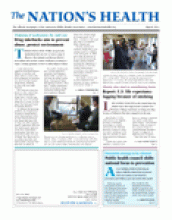As news outlets issue their yearly “best companies to work for” rankings, some public health advocates are hoping health will figure prominently in the equation in coming years.
A new accreditation program is being tested that will help employers assess health management and well-being initiatives against established standards and best practices.

A new accreditation program is designed to be applied in a variety of workplace settings, including industries.
Photo by Mircea Bezergheanu, courtesy iStockphoto
The idea behind HealthLead is to offer support not only for wellness initiatives such as weight loss and smoking cessation at the workplace, but also to measure employers on opportunities for physical activity, stress reduction and a wealth of health indicators that can translate into more productive workers.
“What we’re trying to do is take this to the next iteration going beyond wellness,” said APHA member J. Nick Baird, MD, CEO of the Alliance to Make U.S. Healthiest, which developed the program. “If we include not only physical well-being but emotional, physical, environmental — it is so clear at least to those of us working on this that it provides significant increases in productivity, and productivity relates pretty darn closely to shareholder value. It just makes sense.”
Among the four companies that have gone through early testing of the program, the 70-employee Association of State and Territorial Health Officials in Arlington, Va., represents a small employer as well as the health sector.
“We are very health-oriented, and then the opportunity to get involved in this arose,” said APHA member Paul Jarris, MD, MBA, executive director of ASTHO and also a board member of the Alliance to Make U.S. Healthiest. “And so I looked at it to say, ‘hey we are health-oriented, isn’t this cool? These experts actually put standards together.’”
Jarris’ organization, for example, has a healthy foods policy that aims to ensure food choices such as whole grains, low-fat dairy products and fresh fruit are available at meetings.
“How many public health meetings do you go to where they’re serving mega donuts and cholesterol slabs?” Jarris told The Nation’s Health. “It’s hypocritical.”
Other organizations that are testing the accreditation program are Target, steel processor Worthington Industries and OhioHealth, showing the range of settings where the program can be applied.
The accreditation program, which is set to enter a second testing phase in late March and then be offered to companies nationwide by the fall, should help address such problems, Jarris said, and help both large and small employers “walk the walk and not just talk the talk” when it comes to running a healthy company.
“If we use this as a tool to drive learning and to recognize certain standards and benchmarks that have been validated and we drive people to this place, that’s what we’re about,” Baird told The Nation’s Health. “All we’re trying to do is improve health.”
The program is organized around what Baird described as wellness “pillars.” One would be organizational engagement and alignment, or whether the employer provides tools such as affordable, healthy foods in the cafeteria and places for workday walk breaks.
Another pillar examines how the employer looks at population health management and well-being and whether those issues are measured and reported to a board of directors.
“A lot of these things measured really go beyond, ‘do you have a weight loss or smoking reduction program?’” Baird said. “It really gets at, ‘is health a part of the culture of the organization?’ That’s what we’re trying to do, so that well-being is the gold standard and fitness and health is the culture rather than the obvious opposite of that.”
For more information on the HealthLead accreditation program, visit www.healthiestnation.org.
- Copyright The Nation’s Health, American Public Health Association









